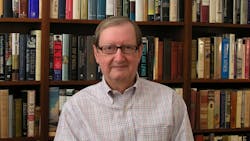As the year 2013 begins, the first question every manufacturing manager needs to be asking and answering is “Why do we exist?”
The existential question is as ancient as the writings of the early Greek philosophers and as modern as the demands of contemporary global manufacturing. In manufacturing today, only after executives have established compelling reasons for their companies to be in business do they have a responsible basis for asking and answering such operational questions as: What are our strengths? What are our weaknesses? What is market demand—and how is it changing? What are our human resource needs and our capital requirements? Who are our competitors—and where are they? And where does this company need to be in one, two, three and five years?
At each company—or in each manufacturing plant—the answer to the question “Why do we exist?” may be called a mission statement, or a purpose statement, or some other kind of statement. The label doesn’t matter; the content does.
During nearly four decades as a writer at IndustryWeek, I read several thousand manufacturing company mission statements. More than a few were hollow. They left me wondering why the companies were ever established and how they could possibly remained in business.
During my years at IndustryWeek, I read hundreds of IndustryWeek Best Plants Award applications. And in decided contrast to some hollow statement, a carefully crafted and concise statement of purpose characterized virtually every one of those applications. Significantly, many plant managers candidly confessed that writing a proper purpose statement—a precise statement justifying the plant’s existence—was both the most challenging and the most rewarding part of the application process.
For some, it meant delaying their applications by a year.
It’s easy to be preoccupied with the present in business and in life. It’s with us every day, for better or worse. However, even when today is fairly comfortable—and for most manufacturers in North America today is more uncomfortable than comfortable—the present is not the place from which to begin. Starting with the present arrogantly presumes that current manufacturing policies, practices and processes are best performers for producers, their suppliers, their customers, and the communities in which they operate and market. Starting with the present avoids confronting hard or unpleasant underlying truths about a manufacturing plant’s operations and a manufacturing company’s existence.
Instead, ask that most basic of questions, “Why do we exist?” And ask it not only at the beginning of 2013 or any future year. Only by periodically asking—and answering—with authority the existential question does there exist a rational basis for executing all the responsibilities for which manufacturing managers are rightfully held accountable in a world of business challenge and change.
This is another of a series of occasional essays by John S. McClenahen, who retired from IndustryWeek in 2006 and remains an interested observer of global manufacturing.
About the Author
John McClenahen
Former Senior Editor, IndustryWeek
John S. McClenahen, is an occasional essayist on the Web site of IndustryWeek, the executive management publication from which he retired in 2006. He began his journalism career as a broadcast journalist at Westinghouse Broadcasting’s KYW in Cleveland, Ohio. In May 1967, he joined Penton Media Inc. in Cleveland and in September 1967 was transferred to Washington, DC, the base from which for nearly 40 years he wrote primarily about national and international economics and politics, and corporate social responsibility.
McClenahen, a native of Ohio now residing in Maryland, is an award-winning writer and photographer. He is the author of three books of poetry, most recently An Unexpected Poet (2013), and several books of photographs, including Black, White, and Shades of Grey (2014). He also is the author of a children’s book, Henry at His Beach (2014).
His photograph “Provincetown: Fog Rising 2004” was selected for the Smithsonian Institution’s 2011 juried exhibition Artists at Work and displayed in the S. Dillon Ripley Center at the Smithsonian Institution in Washington, D.C., from June until October 2011. Five of his photographs are in the collection of St. Lawrence University and displayed on campus in Canton, New York.
John McClenahen’s essay “Incorporating America: Whitman in Context” was designated one of the five best works published in The Journal of Graduate Liberal Studies during the twelve-year editorship of R. Barry Leavis of Rollins College. John McClenahen’s several journalism prizes include the coveted Jesse H. Neal Award. He also is the author of the commemorative poem “Upon 50 Years,” celebrating the fiftieth anniversary of the founding of Wolfson College Cambridge, and appearing in “The Wolfson Review.”
John McClenahen received a B.A. (English with a minor in government) from St. Lawrence University, an M.A., (English) from Western Reserve University, and a Master of Arts in Liberal Studies from Georgetown University, where he also pursued doctoral studies. At St. Lawrence University, he was elected to academic honor societies in English and government and to Omicron Delta Kappa, the University’s highest undergraduate honor. John McClenahen was a participant in the 32nd Annual Wharton Seminars for Journalists at the Wharton School at the University of Pennsylvania in Philadelphia. During the Easter Term of the 1986 academic year, John McClenahen was the first American to hold a prestigious Press Fellowship at Wolfson College, Cambridge, in the United Kingdom.
John McClenahen has served on the Editorial Board of Confluence: The Journal of Graduate Liberal Studies and was co-founder and first editor of Liberal Studies at Georgetown. He has been a volunteer researcher on the William Steinway Diary Project at the Smithsonian Institution, Washington, D.C., and has been an assistant professorial lecturer at The George Washington University in Washington, D.C.
